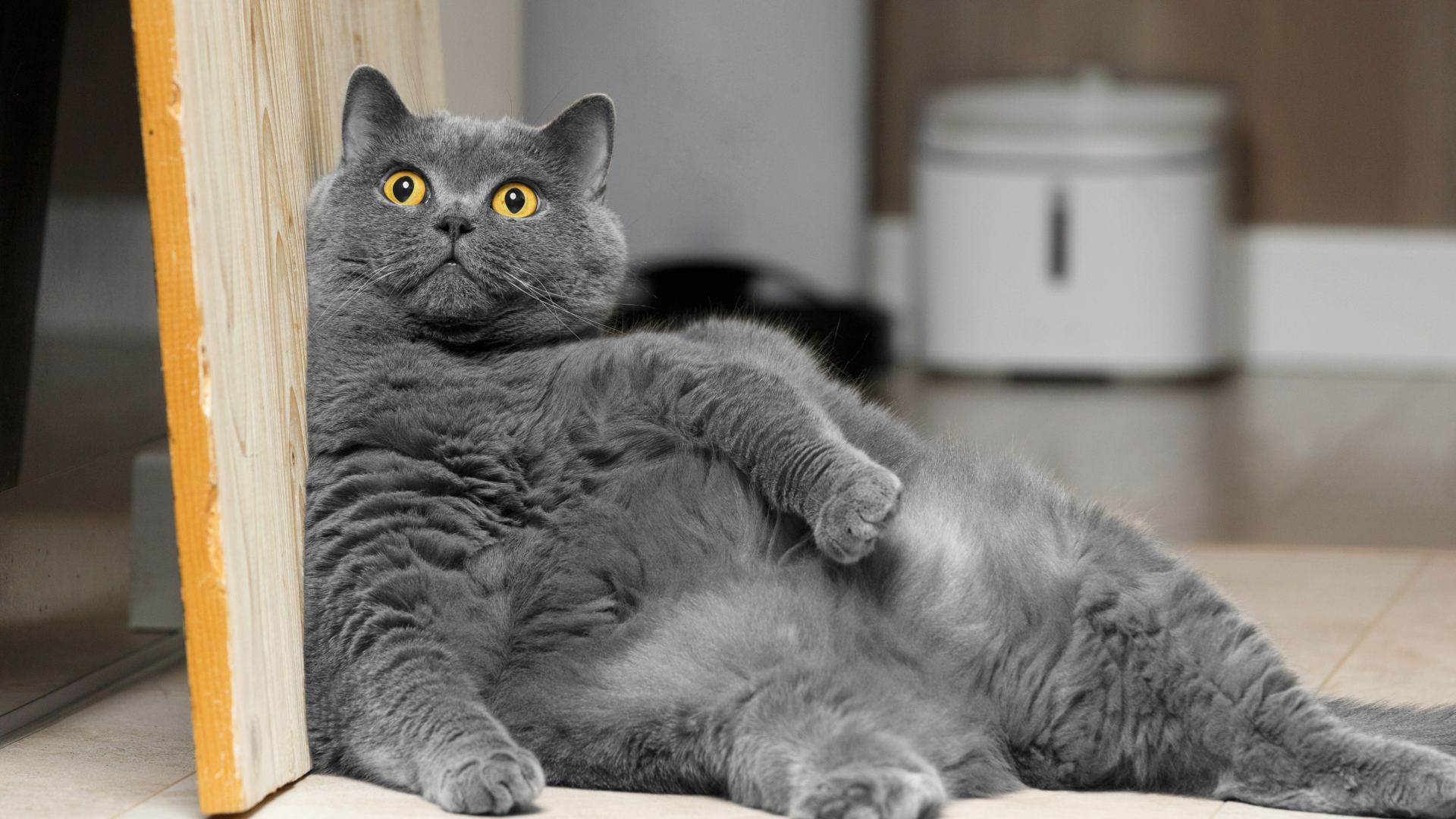Best kitten teething toys to help to soothe sore gums
The best toys for teething kittens will keep them occupied while suffering discomfort and pain
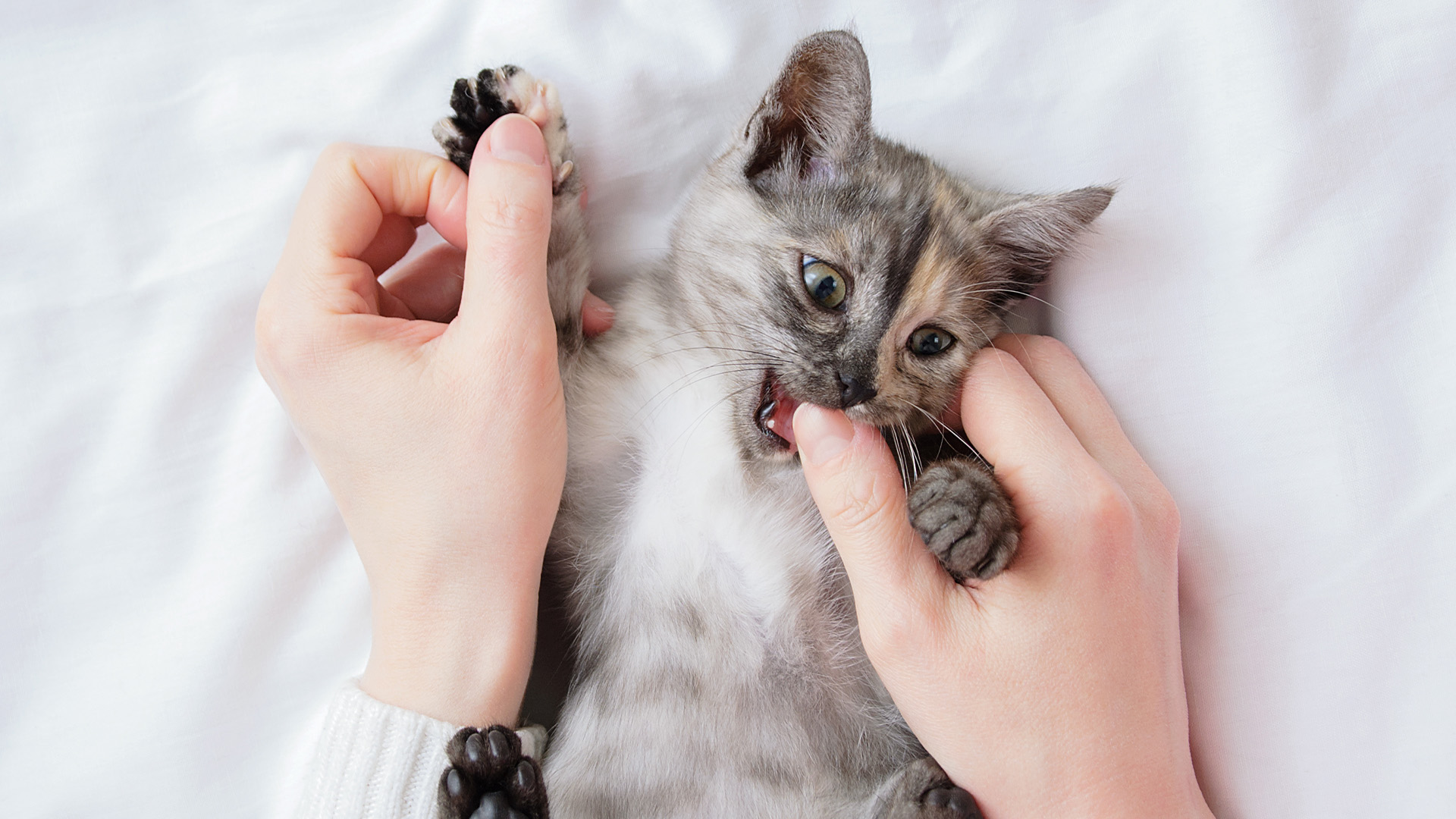
With the best kitten teething toys to hand, you’ll not only make life more comfortable for your pet, you’ll also be able to protect your fingers, clothing, furniture and other belongings. Without a suitable distraction, teething kittens can become aggressive and destructive as they seek to soothe their sore gums. The best teething toys give them something else to mouth and it also teaches them appropriate chewing behavior from an early age.
In this guide we’re going to look at some of the best kitten teething toys while seeking guidance from expert vet Dr. Hannah Godfrey who firmly advises you to invest.
“Kitten teething toys are great and allow your kitten to relieve some of their discomfort while keeping your fingers intact,” she says. So let’s take a look at the best of what’s available.
The best kitten teething toys
Why you can trust PetsRadar
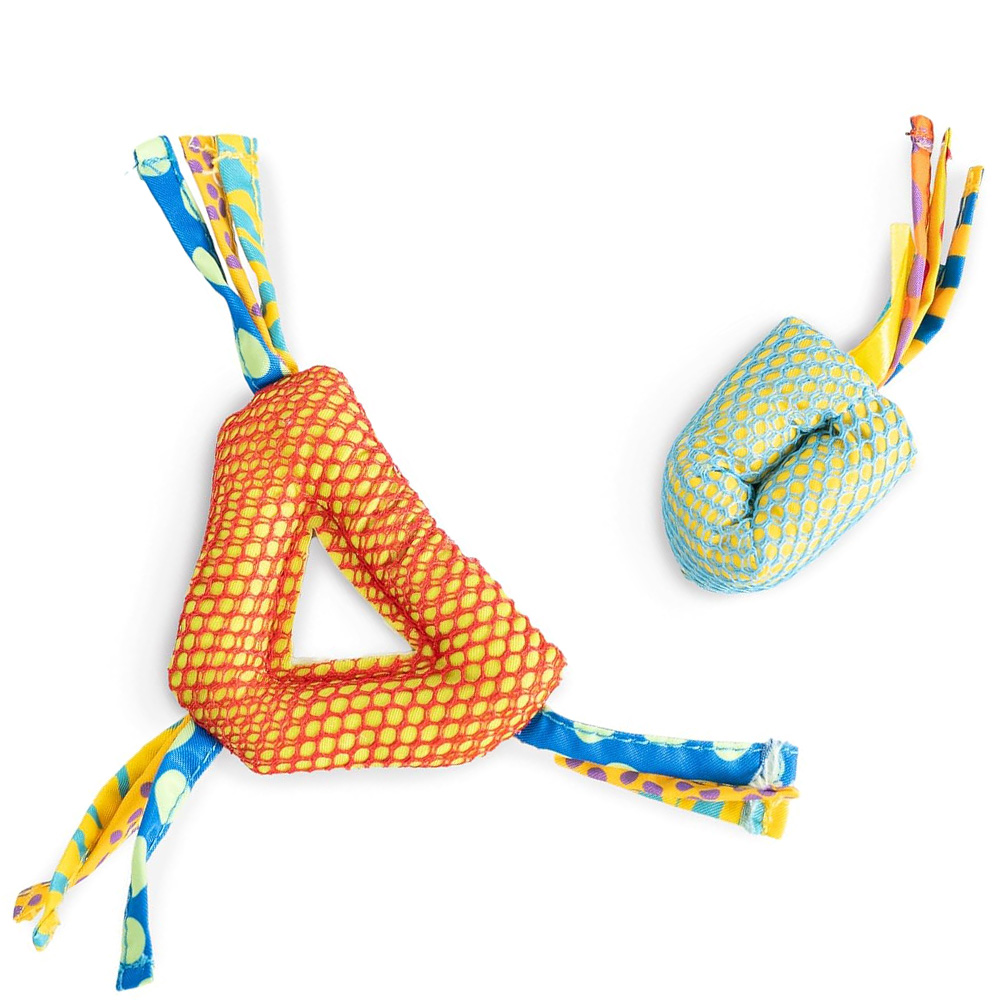
Best overall teething toy for kittens
These two dental kitten chew toys will give kittens hours of fun and keep their teeth in tip-top condition. They’re covered with a strong, durable mesh material that gently removes soft plaque and tartar from your kitten’s teeth. They won’t unravel either, no matter how hard your kitty chews on it.
With two toys in the set, you’re certainly getting good value. Both offer the teeth cleaning mesh material and, because they are different shapes and colors with different features, they’ll entice your kitten to bat and play in various ways.
The toys have feathers, bells and strands of various fabrics as well as catnip sewn into different sides of the perfectly-sized chew toy. It helps to create a more rounded multi-sensory experience that will keep your kitten happy, occupied, and fulfil their teething needs.
Reasons to buy: As well as ensuring a distraction during the teething process, this toy will also keep teeth clean.
Reasons to avoid: The toys are a bit on the small side but you get two and they have an abundance of sensory features.
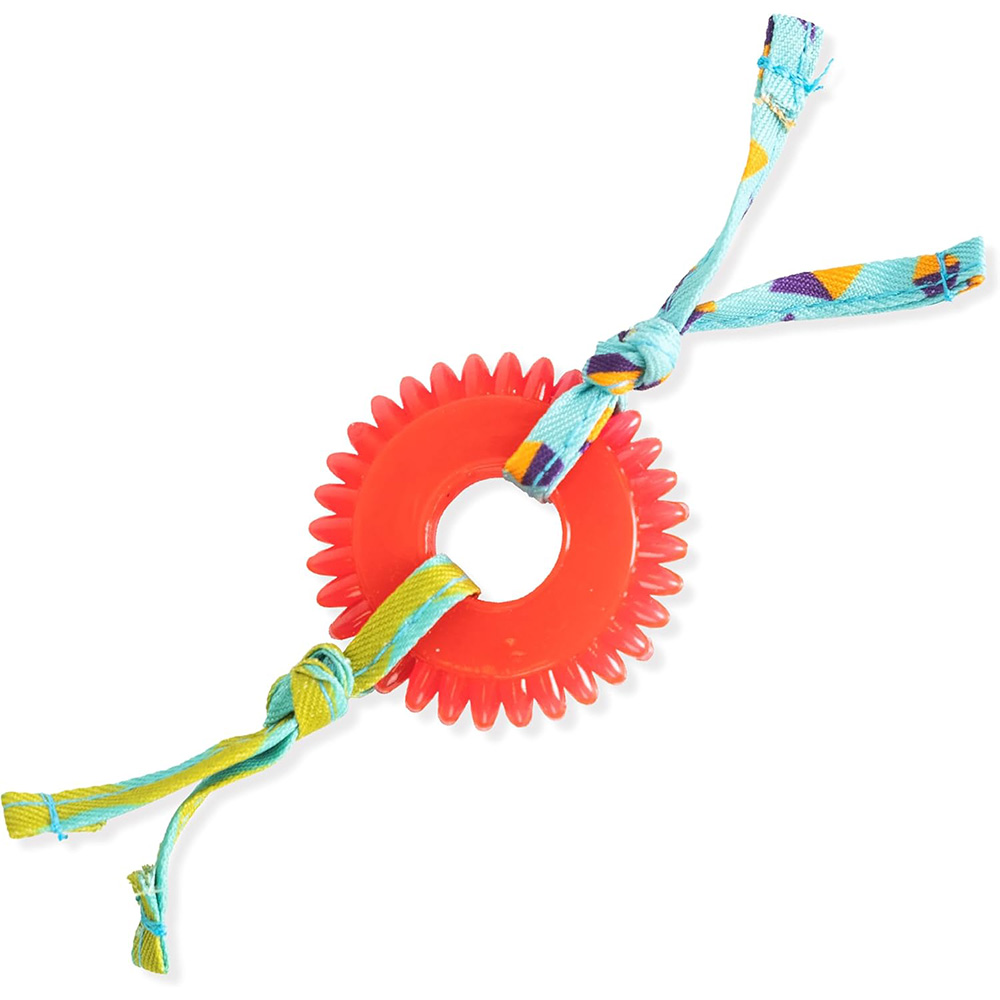
Best budget teething toy for kittens
The centerpiece of this toy is a durable, food-safe rubber ring that is gentle on the gums and satisfying to bite. Since the ring’s outer edge is surrounded by a ring of spokes, it has the added bonus of improving your kitten’s dental hygiene. The spokes will massage your kitten’s gums which helps remove tartar and ensure there’s no stinky breath.
The hole in the middle of the ring adds another edge for kittens to sink their teeth into but is also the perfect place to tie on a couple of bite-resistant fabric streamers. These streamers provide stimulation and fun for your kitten and the knots in them will even provide another strong chew point. Should the streamers become tattered and worn you could go DIY and simply tie on another couple of streamers or even add feathers or a bell. With catnip oil infused into the product as well, it’s well worth considering.
Reasons to buy: This simple and durable toy can be customized in any way you wish – just bring your imagination.
Reasons to avoid: Just be sure that anything tied to the ring is secure so that it doesn’t pose a potential choking hazard.
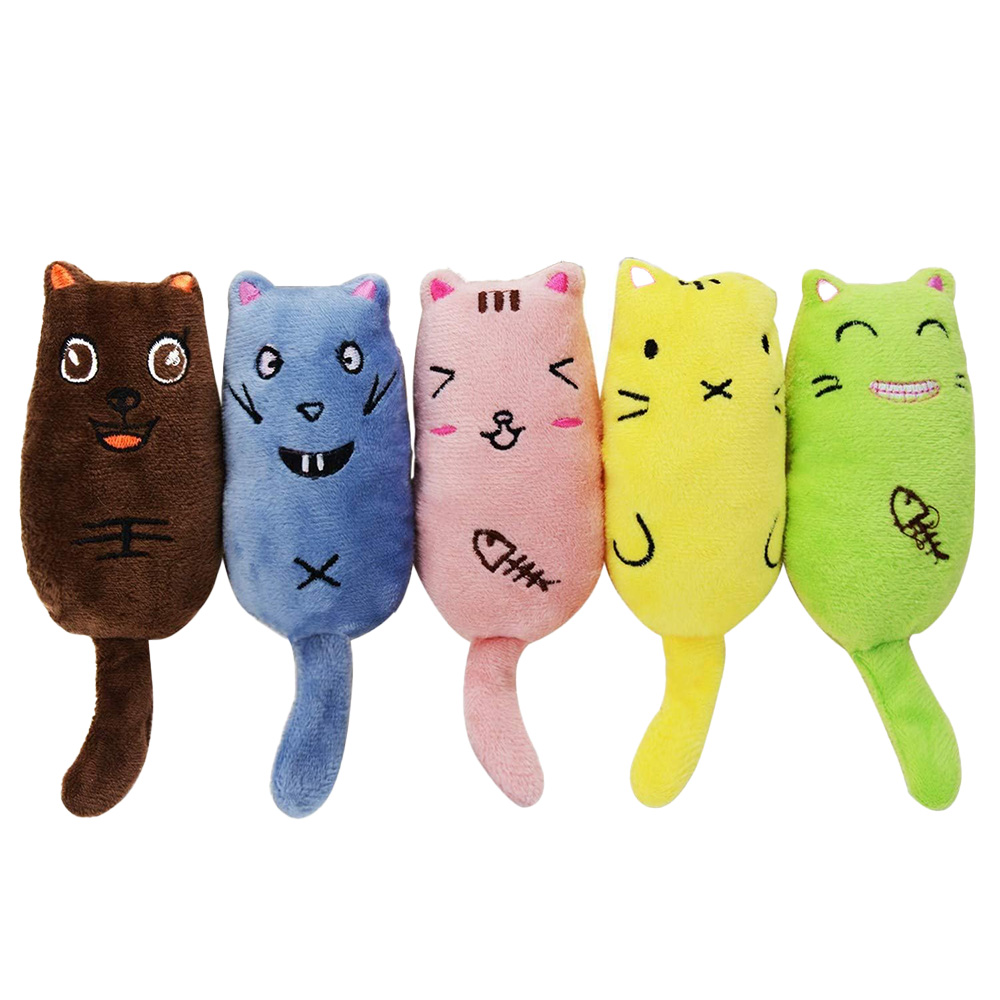
Best soft teething toy for kittens
If you think you’ll have trouble tempting your cat to engage with a teething toy, then it’s always a good idea to opt for one containing catnip. With this set from Legendog you’re getting five toys made from a durable bite-resistant fabric stuffed with safe, soft PP cotton and the all-important perennial herb from the mint family. As such, kittens are sure to rub, kick, roll and, crucially, chew these toys and the good news is that the fine stitching makes it difficult to break them apart.
This, in turn means that your kitten will be able to chew away, and you’ll have the bonus of knowing there’s a good chance that if a cat got bored of one, it’ll be stimulated by another. It also means you’ll get more mileage out of the toys since the catnip in each one cannot be replaced.
Reasons to buy: These toys are stuffed with catnip and they’re made from a bite-resistant fabric.
Reasons to avoid: Unfortunately, you can’t replace the catnip but you do at least get five toys in the set.
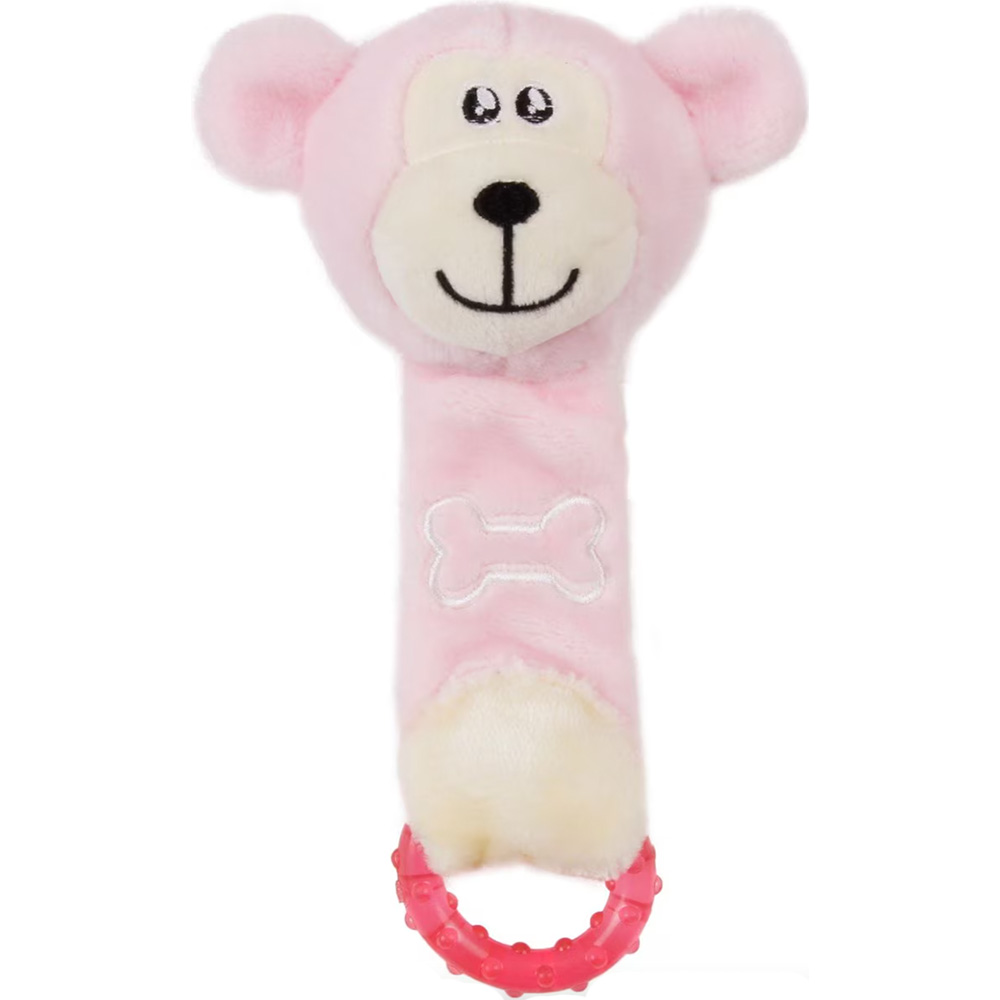
Best noisy teething toy for kittens
Kittens like noisy toys because it reminds them of moving prey. It makes them more likely to want to play with this plush which as well as having a head that will squeak when a kitten bites also includes inner crinkle paper. Having captured their imagination, the toy will satiate a kitten’s desire to relieve the discomfort of teething thanks to its smooth, soft cotton finish. They’ll also be able to make use of the rubberized chew ring which helps to keep teeth in good shape by removing and reducing the buildup of plaque and tartar.
Just as importantly, the toy is sure to last beyond the teething phase because it’s not only robust and durable thanks to its dual-reinforced stitching but machine washable as well. It also comes in three colors – yellow, pink or blue – which may not matter too much to your cat but is fun nonetheless.
Reasons to buy: Soft and durable, these mildly noisy toys will encourage your kitten to bite.
Reasons to avoid: It may be a little too big for some kittens but they’re sure to love it anyway.
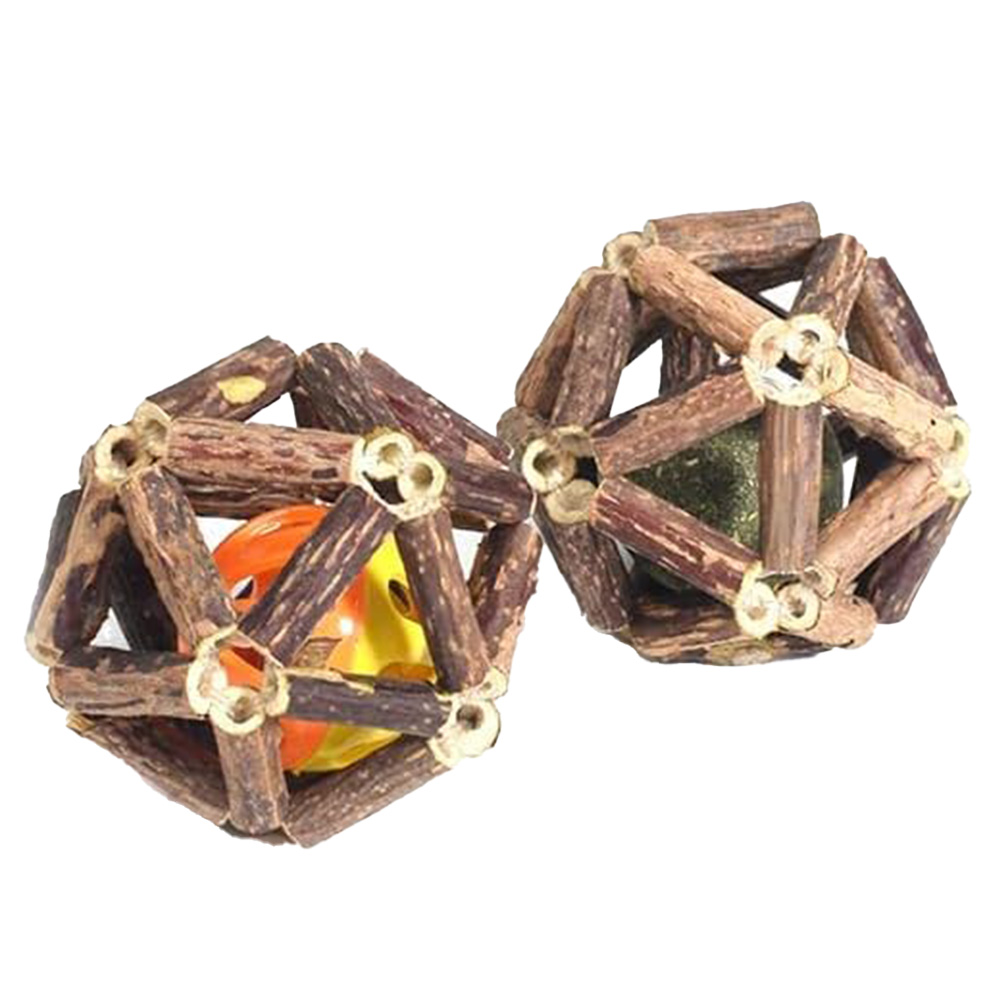
Best silvervine teething toy for kittens
These balls contain silvervine – a member of the kiwi family that is similar to catnip in that it drives kittens wild due to its smell. As with catnip, the euphoric effect it produces is going to entice your kitten to engage with the product (especially given it contains catnip as well) and that will make them more likely to bite and chew.
Since it has a hand-woven exterior, no chemical adhesives have been used to make the product, making for a safe toy. Silvervine is also safe to consume so you don’t need to worry if they ingest it because it’s said to promote gastrointestinal mobility. What’s more, as they bite, more aroma is released so it’s going to engage a kitten for a good while. The texture of the silvervine will be good for a kitten’s dental health too. It’s a nice teething toy all round.
Reasons to buy: Safe and attractive, these cage balls will keep your kitten occupied for days.
Reasons to avoid: Surprisingly, some cat owners say their kittens won’t touch them but felines are fickle.
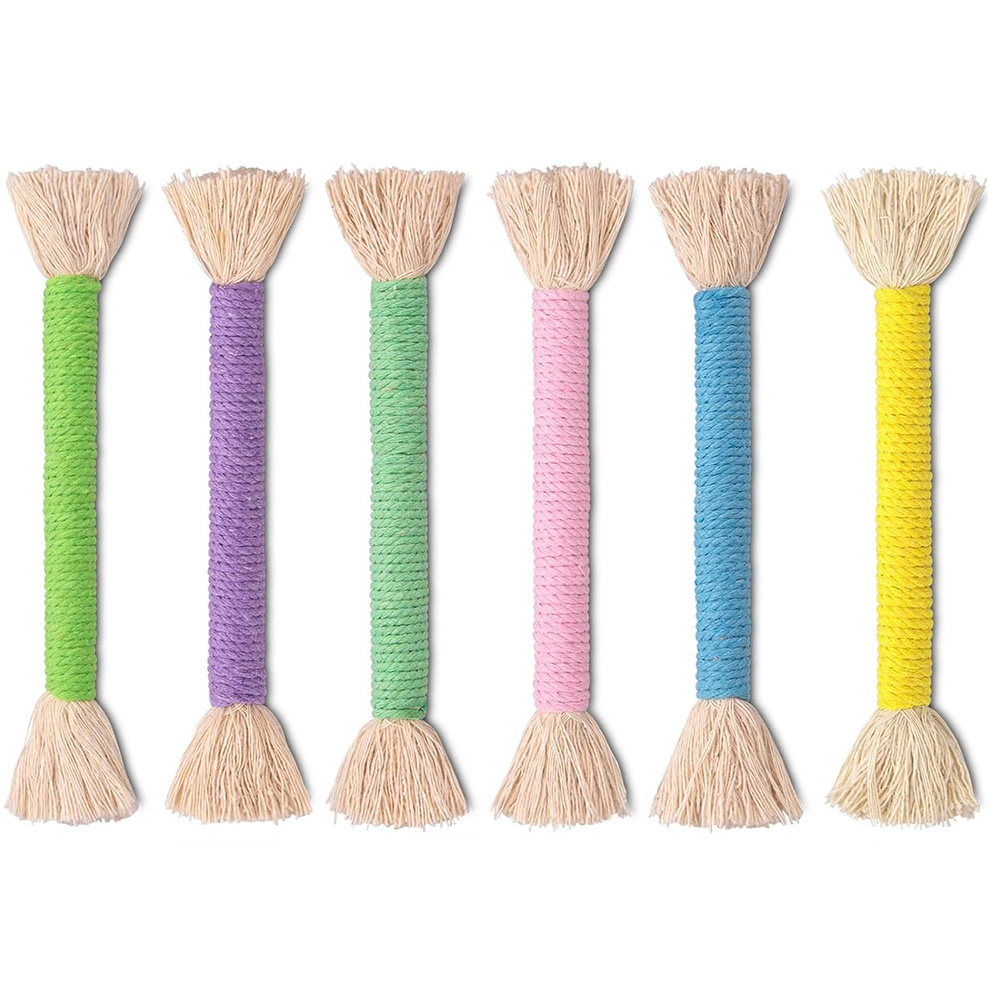
Best durable teething toy for kittens
Made from natural sisal rope, this teething toy is hand woven and wire-free. It also includes a kitten’s favourite plaything – tassels of string – which will pique their interest no end. There’s plenty of space on the long, wide rope for a kitten to sink its teeth into and, because of its texture, it will help to sooth any pain and discomfort while also maintaining good dental health.
The simple nature of the product is one of its virtues. It doesn’t really try to be fancy and it also means you can easily engage with your pet: hold it on end, play around and your kitten will likely engage which will steer attention away from other objects in your home. A bag of catnip is included for further encouragement and the general consensus is that kittens appear to like the toy.
Reasons to buy: A straightforward rope with tassels that has plenty of space on which to chew.
Reasons to avoid: The catnip isn’t on the rope itself but in a separate bag but it’s no biggie, to be honest.
How we chose the best teething toys for kittens
In order to be effective, we recognised that a teething toy needs to be attractive. Cats are fickle creatures at the best of times so we were on the lookout for toys that would not only attract their attention but manage to hold it for a short but not insignificant amount of time.
We focussed primarily, then, on kitten teething toys made from a softer, easily chewable material, which acknowledges kittens won’t be teething for too long and therefore wouldn’t need heavy duty rubber options. That said, it’s always important that a teething toy is durable so as to avoid potential injury or choking.
When does teething in kittens start?
Teething begins early in life for kittens, explains expert vet Dr. Hannah Godfrey.
“Kittens lose their 'baby' teeth at around three or four-months-old – and while they're teething, you might find that they bite or chew things more.”
The good news is that they will only teeth for a few weeks but that doesn’t mean it isn’t a crucial stage nor that you can’t reap some benefits by taking positive action at this time.
Signs a kitten is teething
Teething is entirely natural but it can make pet owners concerned. Key signs include....
- decreased appetite
- excessive chewing
- red, inflamed or bleeding gums
- less frequent grooming
- pawing at mouth
Why are teething toys for kittens important?
Cats can display unwanted behavior when teething and this behavior can become normalised if their actions are not managed.
“Pet owners sometimes come to me for advice when their kitten is teething, especially if they're not sure why their kitten has developed a sudden tendency to bite,” explains Dr Godfrey, who says that taking action during the temporary teething phase can make for a better behaved cat.
“If kittens aren't encouraged to bite hands (or feet!) and are provided with something else to redirect this behavior, they won't usually continue biting in the long term.”
Here are some ways you can stop your kitten biting you.
Which teething toys are most effective?
In general, you should be paying attention to the material a toy is made from and pick toys that your kitten will find easy and satisfying to mouth. Rubber, latex and foam do a great job of providing relief from teething pain, while cotton or plush materials are worth considering as these are easy to nibble on. Toys specifically created for teething kittens will usually have a surface suitable for chewing and be of an appropriate size for your pet.
“Choose a specifically-designed kitten teething toy, since these are less likely to break,” Dr Godfrey says.
Kitten teething toys to avoid
We recommend looking for toys made from non-toxic materials and it’s always a good idea to avoid anything that has small parts that your kitten might break off and accidentally swallow. You may also want to opt for durable playthings so you're not having to replace them every five seconds but be wary if teething appears to last longer than a couple of weeks or appears to be causing extreme discomfort.
“Teething doesn't usually last longer than a couple of weeks, and it shouldn't affect your kitten's appetite or cause them significant discomfort. If you're concerned that your kitten is in pain with teething, it's best to speak to a vet,” Dr Godfrey says.
Want to learn more? We’ve got a guide on how to brush your cat’s teeth, too! Or, read our guide on how to play with a kitten and how to make DIY kitten toys.

After graduating from the Royal Veterinary College in 2011, Dr. Hannah Godfrey BVetMed MRCVS went on to work in a busy practice dealing with animals of all shapes and sizes. She’s since found a love of smaller animals and now works in a small companion animal practice in Wales, where she combines her love of animals with her love of writing.
PetsRadar Newsletter
Get the best advice, tips and top tech for your beloved Pets

David Crookes has been a journalist for almost 30 years and he has written for a host of magazines, newspapers, websites and books including the World of Animals Annual, BBC Earth, Live Science, The Independent and Tom’s Guide.
Born in England, he lives with two cats but he’s also keenly interested in the differences between the huge number of dog breeds – in fact, you can read many of his breed guides that he’s written in collaboration with vets here on PetsRadar.
With a lifelong passion for technology, too, he’s always on the lookout for useful devices that will allow people to keep their pets happier and healthier, and provide them more time to spend together.
David has a degree from Durham University, as well as postgraduate diploma in journalism from the University of Central Lancashire.
